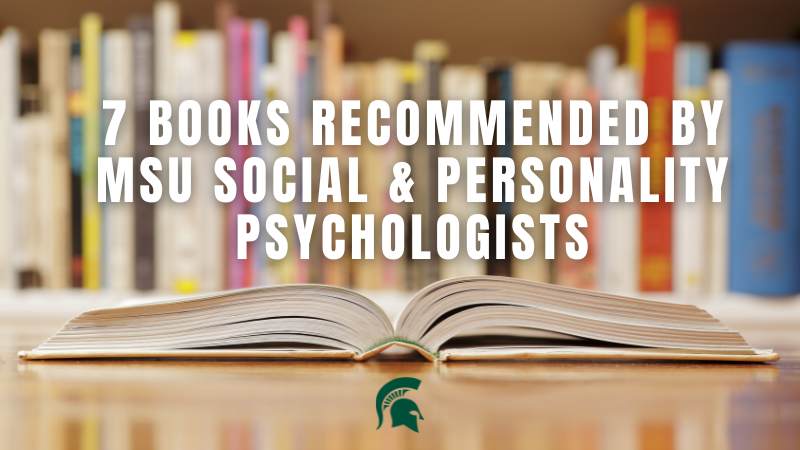7 books recommended by MSU social & personality psychologists
December 17, 2024 - Shelly DeJong

If you browse through the psychology section of any bookstore, you'll find plenty of books that aim to explain the complexities of human behavior and personality. But where to begin?
Here are seven books recommended by Michigan State psychology faculty who focus their research on understanding human social behavior and personality. These books delve into various aspects of psychology—from persuasion to social networks!
1. Influence: The Psychology of Persuasion by Robert Cialdini
“An absolute classic that is applicable to so many fields - Social Psychology, Business, Communications, etc. However, I am somewhat biased because I was lucky enough to work in Dr. Cialdini's research lab when I was an undergrad at Arizona State University. So, read this book and then get involved in a research lab!” - Jonathan Weaver, PhD.
2. The Genetic Lottery: Why DNA Matters for Social Equality by Paige Harden
“It's a very thought-provoking description of modern psychological genetic research that raises philosophical questions worth pondering, like "how can we design society to account for both nature and nurture?” Also, unlike a lot of pop psych books that oversimplify these complex issues, Paige does a good job grappling with the mess and complexity of the actual research.” - Ted Schwaba, PhD.
3. Connected: The Surprising Power of Our Social Networks and How They Shape Our Lives by James H. Fowler and Nicholas A. Christakis
"As a network researcher, I like Connected which provides a nice popular press account of the role of social networks in people’s lives.” - Jennifer Watling Neal, PhD.
4. The Power of Us by Jay J. Van Bavel and Dominic J. Packer
“Groups are important to people. We identify with them and they give people a sense of belonging. Groups can also have downsides, motivating us to hate people who don’t share our group memberships. The Power of Us is written by two excellent social psychology who study groups and social identities, Jay van Bavel (New York University) and Dominic Packer (Lehigh University). They explore why groups are so important for humans. They dive into the perils of groups, like prejudice, polarization, and social conflict while focusing on how we can overcome these downsides and maximize groups’ positive potentials, like cooperation and shared decision-making.” - Mark Brandt, PhD.
5. Pathologies of Power: Health, Human Rights, and the War on the Poor by Dr. Paul Farmer
"Dr. Farmer’s book chronicles his work with marginalized communities in Haiti, Mexico, and Russia. He argues that human rights violations are linked to social conditions—particularly, in who is harmed and who is protected in society. Another big point he makes is that the biggest human rights challenge of our time is to improve economic and social rights for people in poverty around the world.” - Kas D. Anderson, Jr., PhD.
6. The Undoing Project by Michael Lewis
“This book works on multiple levels. It details the research behind classic (and Nobel prize winning) findings on biases and heuristics and describes how that works shapes our current understanding of judgment and decision making. It is also an interesting biographical account of friendship, collaboration, and the evolution of research programs. It is easy to read and offers surprising insights into the ways our minds work.” - Brent Donnellan, PhD.
7. Discrimination and Disparities by Thomas Sowell
“This book is a great introduction for people interested in the topic of why outcomes differ across social groups. It is not a comprehensive summary of all that is known on this topic, but instead provides the reader with a framework for asking questions about this topic. It also nicely connects assumptions about the causes of group outcomes to social policies based on those assumptions and explores the ways in which incorrect assumptions about group disparities can lead to unintended negative policy outcomes.” - Joseph Cesario, PhD.

